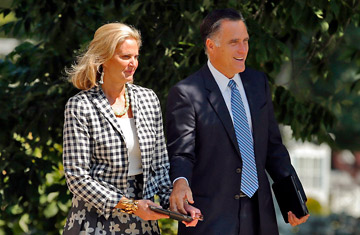
Romney and his wife Ann leave the Church of Jesus Christ of Latter-day Saints near their lake house in Wolfeboro, N.H.
(2 of 6)
Like most other presidential candidates, Romney speaks of such matters in general, not in particular. "I will be true to ... my beliefs," he declared in his most expansive discussion of his faith and politics, a 2007 speech delivered at George H.W. Bush's presidential library. "Some believe that such a confession of my faith will sink my candidacy. If they are right, so be it. But I think they underestimate the American people. Americans do not respect believers of convenience. Americans tire of those who would jettison their beliefs, even to gain the world."
Yet in the search for the real Romney in these last weeks of the race for the White House, there's much to be said for beginning at the beginning, with what Romney has called "the faith of my fathers." In his address at the Bush library, Romney said, "I was taught in my home to honor God and love my neighbor ... I saw my parents provide compassionate care to others, in personal ways to people nearby and in just as consequential ways in leading national volunteer movements ... My faith is grounded on these truths. You can witness them in Ann and my marriage and in our family. We are a long way from perfect, and we have surely stumbled along the way, but our aspirations, our values, are the self-same as those from the other faiths that stand upon this common foundation. And these convictions will indeed inform my presidency."
Observers have long sought clues to Romney's character and worldview in his Mormonism. There is the optimistic salesmanship, the blindingly pure family values, the can-do spirit. In many ways Romney is Reagan with children who speak to him, a cheerful leader who has a mystical appreciation of the role America is meant to play in history.
What is less appreciated is the Mormons' historical sense of siege and of tragedy. By cultural and theological conditioning, Romney expects life to be difficult, even confounding--hence the need for the analytical skills of a management consultant. Mormons are accustomed to conflict and expect persecution. The Mormon sense of destiny gives followers a part in a divine story, a larger saga of the conflict between good and evil, infusing their lives with both great purpose and keen pragmatism. Viewing Romney through the lens of the Mormon understanding of history helps explain his ambition, his devotion to personal liberty and his comfort with expediency.
Joseph Smith's Journey
The story of Mormonism--the quintessential American religion--begins with Joseph Smith Jr., who experienced visions in the first third of the 19th century to restore what Smith said was a fallen and corrupted church. Through his own prophecies and the Book of Mormon, Smith founded a faith that emphasized America, and Mormon leaders have long held that American greatness was contingent on the moral choices of its people--choices that were to be made by free will, or what is known as moral agency. In the Mormon cosmology, life in this fallen world is a constant struggle between good and evil.
In December 1833, Smith and his followers were in a bad spot. They had moved to Missouri to build their Zion, the place they believed would ultimately serve as what a 20th century Mormon leader, Ezra Taft Benson, would call the Lord's "base of operations."
